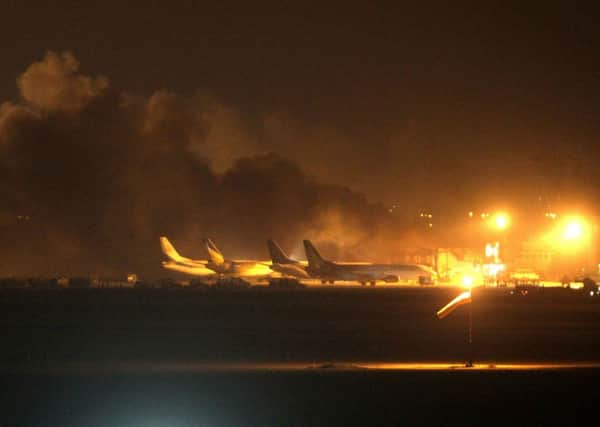18 killed in Taleban attack on Karachi airport


Gunmen disguised as police guards stormed the international terminal in Karachi and set off explosions.
The Taleban said the assault on Jinnah International Airport in Karachi, the capital of southern Sindh province, was in revenge for the killing last November of the militant group’s leader in a US drone strike.
Advertisement
Hide AdAdvertisement
Hide AdIt further diminished prospects for a resumption of government-led peace talks with the Taleban. Those talks floundered in recent weeks and the militants have called off a ceasefire they declared during negotiations.
Since then, Pakistani troops have carried out airstrikes in the country’s troubled north-west to target militant hideouts, killing dozens of suspects. Residents claim several civilians were also killed.
The Karachi assault started late on Sunday when ten gunmen, at least some disguised as policemen, opened fire with machine-guns and rocket launchers, triggering a gun battle with police during which all the attackers were killed.
Heavy gunfire and multiple explosions were heard coming from the terminal, used for VIP flights and cargo, as militants and security forces battled for control.
A major fire rose from the airport, illuminating the night sky. As dawn broke, smoke could still be seen billowing in the air.
The authorities diverted incoming flights and suspended all flight operations.
An Emirates flight bound for Dubai had to be cancelled and passengers were escorted off the plane because of the fighting. “The passengers and crew disembarked the aircraft and were taken to a secure area of the terminal,” the airline said. It did not say how many passengers had been onboard.
Emirates operates multiple daily flights to Karachi and other Pakistani cities. It said the airport’s closure would continue to affect other flights into Karachi.
Advertisement
Hide AdAdvertisement
Hide AdEtihad Airways, based in Abu Dhabi, said it was delaying its flights to Karachi and would monitor the situation.
Rizwan Akhtar, chief of Pakistan’s elite paramilitary rangers, said no planes had been damaged during the attack but a cargo building had been gutted by the fire and the explosions.
Just before dawn, Pakistani security forces regained full control of the airport. Mr Akhtar said some of the attackers appeared to be Uzbeks, but officials were still investigating to determine their identity and nationality.
“The terrorists entered the terminal in two groups. They were foreigners, and some of them seemed to be Uzbeks,” Mr Akhtar said.
Pakistan’s Civil Aviation Authority said security forces had given them back control of the airport.
Dr Seemi Jamali, from Karachi’s Jinnah Hospital, said 18 bodies had been taken to the morgue, 11 of whom were airport security personnel. The bodies of the attackers remained in police custody.
An official at the scene of the attack said at least some of the gunmen had worn the uniform of the Airport Security Force. All had been wearing explosives vests, some of which had detonated when they were shot at by police.
After storming into the airport grounds, the gunmen hunkered down for the shootout with police in two sections of the airport, according to senior police officer Ghulam Qadir Thebo.
Advertisement
Hide AdAdvertisement
Hide AdTaleban spokesman Shahidullah Shahid said the attack had been to avenge the killing of Hakimullah Mehsud, the militant group’s chief who died in a drone strike last November.
Shahid, who speaks for Tehrik-e-Taliban Pakistan, as the Pakistani Taleban is known, said the attack on Karachi airport had been planned before the peace talks started and was put on hold during the negotiations.
He also warned of more attacks to come.
Security officials in Karachi had feared that if the peace talks broke down, their city would be a likely spot for militant retribution.
The Pakistani Taleban and its allies are increasingly gaining a foothold in Karachi, the country’s largest city and the site of frequent militant attacks in the past. It is the country’s economic hub and any militant activity targeting its airport would be likely to strike a heavy blow to foreign investment in the country.
In May 2011, militants waged an 18-hour siege at a naval base in Karachi, killing ten people in an assault that deeply embarrassed the armed forces.